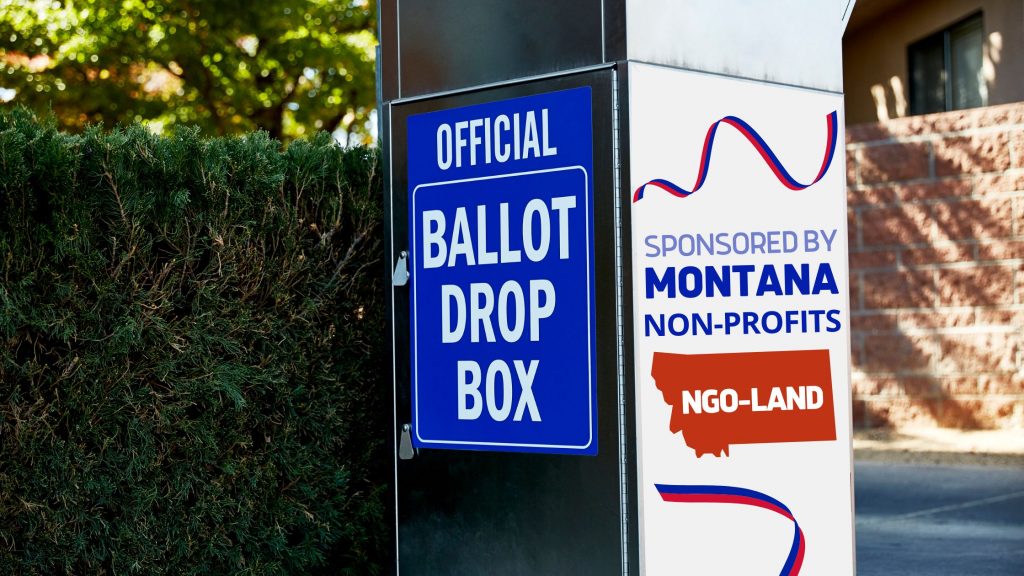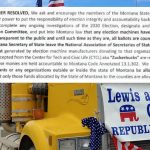Opinion
John Walker & Ariel Forbes
Montana Non-Profits Put Our Sovereignty and Elections at Risk
The release of the documentary film 2000 Mules awakened millions of American voters to the blatant manipulation of the 2020 election. Figuring prominently in this exposé were non-governmental organizations or NGO’s. Non-governmental organizations are often identified as non-profits whose stated goals are to promote humanitarian or social benefits to deserving communities or groups. However, the…
Aug 7, 2022
By John Walker & Ariel Forbes
Opinion Contributor
The release of the documentary film 2000 Mules awakened millions of American voters to the blatant manipulation of the 2020 election. Figuring prominently in this exposé were non-governmental organizations or NGO’s. Non-governmental organizations are often identified as non-profits whose stated goals are to promote humanitarian or social benefits to deserving communities or groups. However, the reality is often far different from their public persona. Utilizing funding from local, national and even international sources, these groups have reached their tentacles into every aspect of the election process from voter registration, voter education, actual election processes and even election equipment with the specific intent of manipulating the outcome.
Well before the release of 2000 Mules a grassroots group of Montana citizens began questioning the involvement of some of these NGOs in our elections and election legislation unveiling the impact they were having in Montana. For example, during the Montana 2021 legislative session, bills were passed to eliminate same day voter registration and paid ballot harvesting, and to tighten voter ID requirements and voter registration guidelines. Due to lawsuits filed against these bills by NGO’s, implementation was blocked on at least portions of each piece of legislation by judicial injunction. Further, in 2018, the citizens of Montana approved by a 64% margin a referendum known as the Ballot Interference Protection Act (BIPA) which was ultimately blocked just before the 2020 election, again by judicial injunction brought forth by Montana NGOs. A repetitive story: legislation enacted, lawsuit filed, injunction issued. Continuing opposition by non-elected NGOs to the will of the people, expressed through their elected representatives.
A little research using the names of the plaintiff organizations involved in these lawsuits and a useful tool called InfluenceWatch.org begins to peel back the layers and reveal a chain of funding and support reaching far beyond Montana’s borders and beyond even those of the United States ultimately impacting not just Montana citizens, but citizens across the United States.
An interesting place to begin to unravel the chain of control and funding are the individual websites and tax documentation for each of the plaintiff organizations identified in the lawsuits. These organizations, per their “Form 990 – Return of Private Foundation” tax forms, claim to be non-partisan and promote a variety of causes—allegedly for the benefit of all Montana citizens—such as environmental action, support to underserved or marginalized communities, and whatever “social justice” causes are currently en vogue, but are they hiding behind their 501(c)(3) and 501(c)(4) tax status to obscure their major donors and blatant partisan objectives?
These websites usually display a list of local staff members, commonly young people, complete with inspiring job titles and appropriate pronouns, and a stated commitment to “make things better.” Interestingly, most, if not all, of these organizational websites have references and links to voter registration and education, appearing almost as an afterthought, but openly promote themselves as “voter mobilization” groups, widely involved in every aspect of our elections.
Dig a little deeper and look at their Board of Directors for a little bit more insight. Directors with long-standing ties to left leaning progressive activist organizations with national and international links are common. An extensive history of political activism in support of liberal and progressive causes is frequently seen in their bios or LinkedIn profiles.
While many of the NGO groups in Montana sport benign or altruistic monikers such as Backcountry Hunters and Anglers Conservation Group, Wild Montana (formerly Montana Wilderness Association), Western Organization of Resource Councils (WORC) (collectively known as “green decoys”), Forward Montana, MontPIRG, Western Native Voice, Montana Youth Action and Montana Voices for example, their political activism is focused predominantly on “voter mobilization” and the leftist agenda of more global governmental control and less individual liberty.

Backtrack through the money trail for these groups and a much more disturbing picture comes into focus. Names Like the Bill and Melinda Gates Foundation, George Soros and the Open Society Foundation, Nathaniel Simons and the Sea Change Foundation, Hansjorg Wyss and the Wyss Foundation, New Venture Fund (Arabella Advisors), The Clinton Foundation and the Tides Foundation— just to name a few—pop-up with disturbing regularity. These organizations have frequently been aligned with a global elitist, far-left agenda not supported by the majority of Montana citizens, yet their funding and resources are changing the face and political landscape of Montana.
To gain a better understanding of how the big dollar donors exert their influence in Montana, let’s take a closer look at the Forward Montana Foundation (the 501(c)(3) sister organization to Forward Montana) and MontPIRG. Their objectives clearly demonstrate a far-left progressive bias while openly claiming to be non-partisan. The real influence behind these organizations becomes clear when you look at their allied organizations as well as their boards of directors. For example, Mathew Singer, who founded The Alliance for Youth Action in Portland, Oregon in 2010 and subsequently founded Forward Montana has an extensive resume of support for liberal causes and in 2012 helped co-found the National Voter Registration Day (NVRD). Public tax data shows the money trail left by most of Matt Singer’s organizations leads back to Arabella and the Clinton Foundation.
Both Forward Montana and MontPIRG, along with several other Montana NGOs have an extensive voter registration and mobilization focus and have been active plaintiffs in legal filings in opposition to recently enacted Montana legislation pertaining to election integrity. Weakening voter integrity laws and making it easier for people to register and vote, along with lobbying for liberal leaning causes and legislation appears to be their central focus.
It is worth mentioning that ballot harvesting is still legal in Montana because both Forward Montana and MontPIRG et al. were plaintiffs in the latest lawsuits against bills passed in Montana’s 2021 legislative session. Both Forward Montana and MontPIRG, along with other Montana NGOs have a strong presence on several Montana campuses, all the way from middle school to college and one quick look at their websites gives you a fair indication on which way they may be influencing students to vote.
Because of what 2000 Mules exposed and extensive research done by various groups and individuals around the nation, we now know that online and remote voter registration drives are potentially used to inflate voter rolls and that drop boxes are being used by NGOs and others to stuff ballots of dubious origin, with no oversight or chain of custody.
There is little doubt that despite their proclamations of being “non-partisan”, the involvement of Montana NGOs in our elections through their liberal activism—no matter how virtuous it appears on the surface—is definitely benefitting one party over another and if we want true transparency in our elections, we need to start holding them accountable.
In addition to the Montana NGOs referenced above, the Center for Tech and Civic Life (CTCL) should be of particular concern. Funded by Mark Zuckerberg and his wife Patricia Chan, among others, the CTCL distributed more than $350 million dollars to various states prior to the 2020 election. This is notable since more than $2.5 million dollars found its way into Montana counties. Twenty-eight Montana counties accepted money from CTCL despite Montana law (MCA 13-1-302) expressly stating that elections in Montana are “to be funded by the counties.”
It has been noticeably challenging trying to determine the mechanism by which the various Montana counties were made aware of the availability of the CTCL funds and under what approval mechanisms the funds were accepted by the counties. The Montana Secretary of State deemed acceptance of these funds permissible at a state-wide level. Montana has the dubious distinction of having some of the highest per capita CTCL funding, by county, in the United States. An even more troubling aspect is that CTCL is partnering with groups such as the Federal Election Assistance Commission (EAC), the Election Infrastructure Initiative (EII) and the National Institute of Standards & Technology (NIST) on an ongoing basis, along with voting equipment manufacturers such as ES&S, forming direct relationships with our county election officials.
With an organization (CTCL) who has direct links to one of the world’s most recognized progressive tech moguls maintaining ongoing participation in the election processes and training, both in Montana and throughout the U.S., how is this not a conflict of interest, on every level?
While most Montana citizens would likely identify direct out-of-state contributions to high visibility candidates as a primary concern affecting election integrity, it is worth noting that tens of millions of dollars, funneled through various NGOs operating on a continuous basis in our schools, universities, and communities are a tremendously powerful force in manipulating local elections, legislation, and judicial activism.
The solutions to this insidious force must include voter education, an involved citizenry willing to question means and motives, and a clear understanding of who is calling the shots that impact our future and that of generations to come. The next time you read of an organization taking action to benefit Montanans, pull back the curtain, do a little homework, and have a closer look—you may be shocked at what you find.
Don’t miss the week’s top Montana stories
Join readers across Montana who rely on WMN for independent reporting.
Unsubscribe anytime. Want to support WMN? Upgrade for $4/month →





